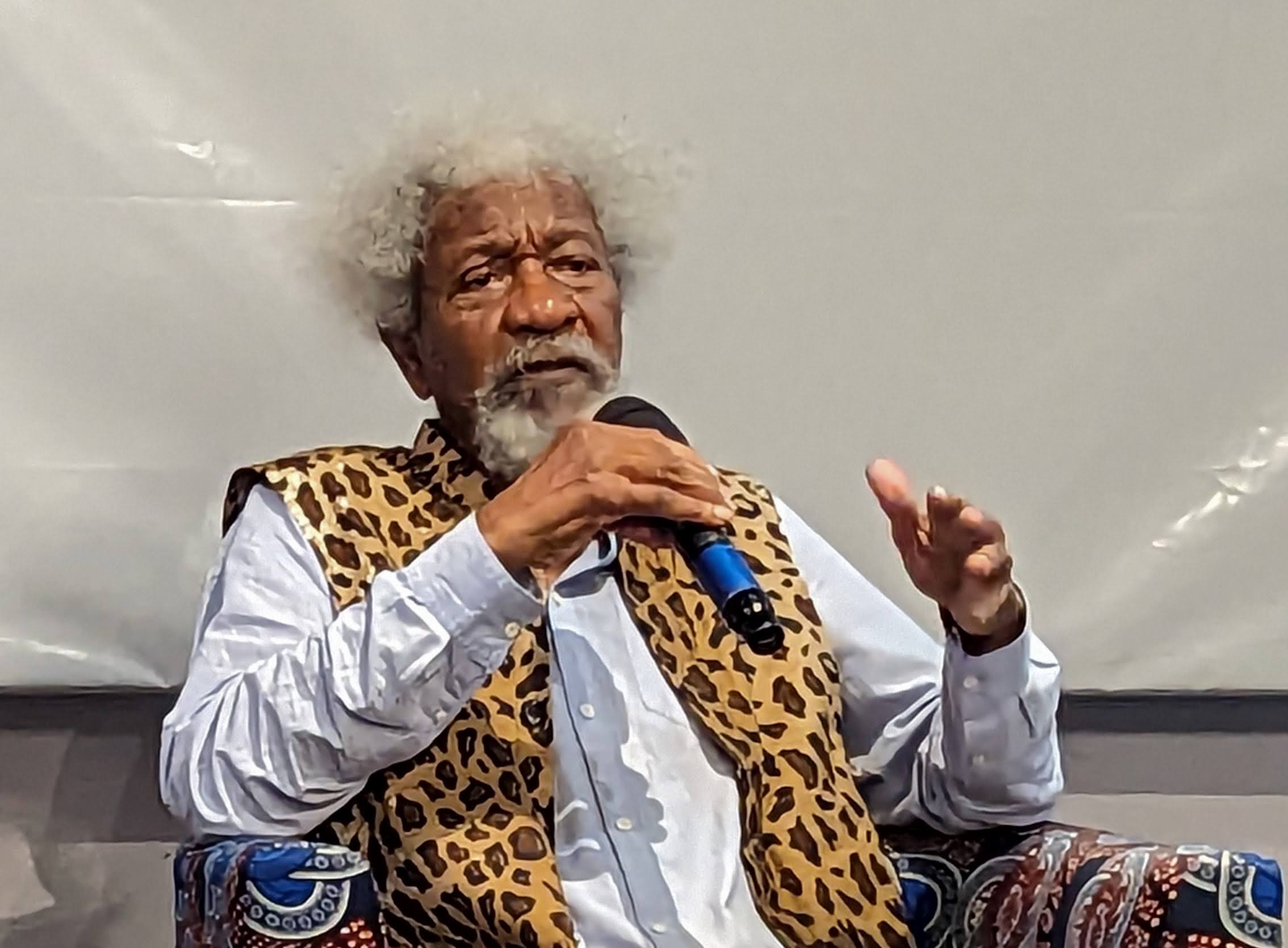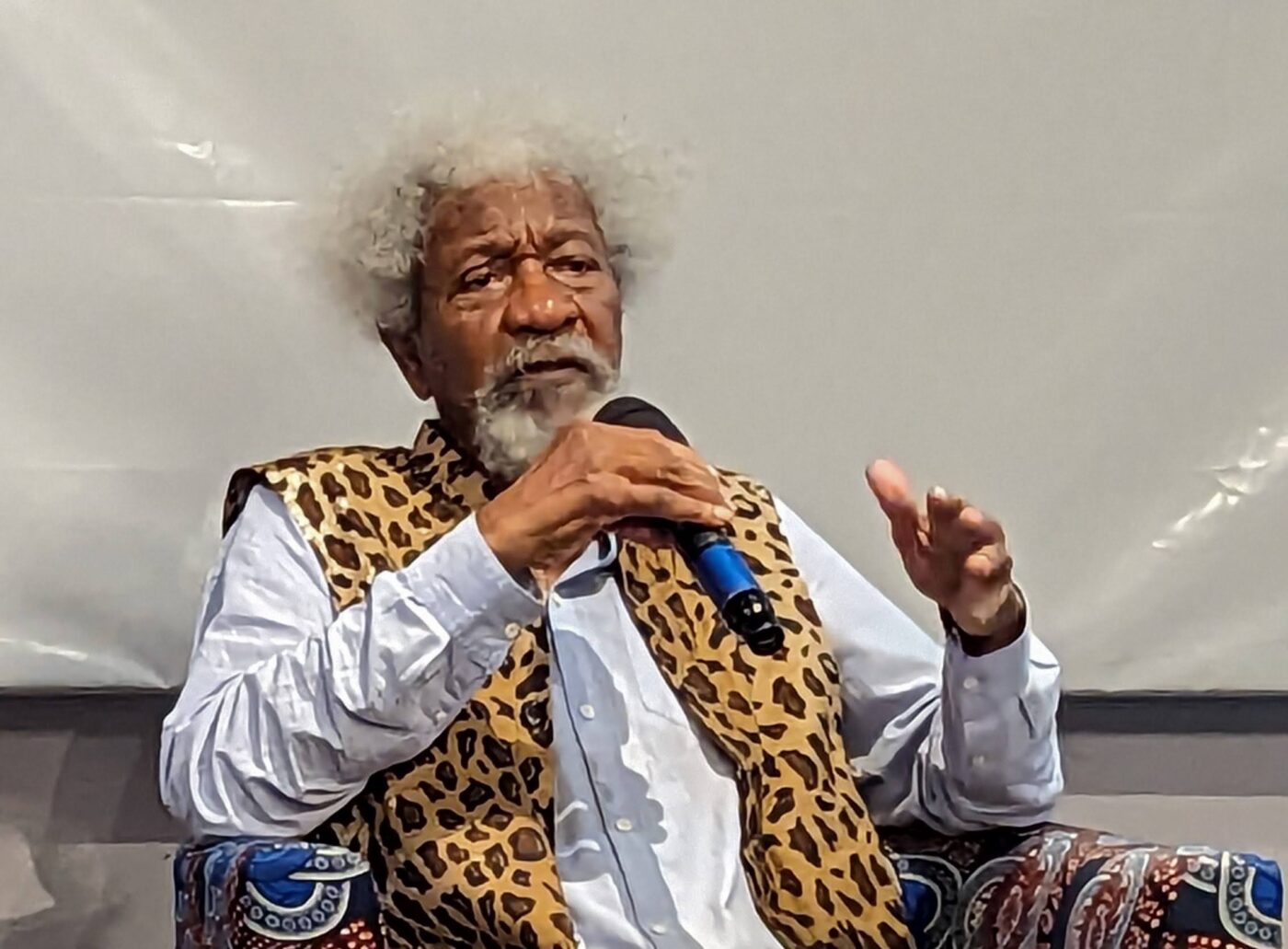
“Thus Counsels Ìṣẹ̀ṣe” by Wọlé Ṣóyínká
[Lecture delivered on September 1, 2023 at the Freedom Park, Lagos.]

ÌSẸ̀ṢE has come, but not gone. We salute all those – human rights activists, community leaders, affronted citizens, advocates of equity, and all – but the state governors most especially – who have taken history to task and boldly formalized a level praying ground for the exploration of the infinite, the realm of intuitions which exists across pedigree, borders, class, politics, social mechanisms and cultures. The battle is not over. There are those who feel compelled to indulge their obsessions through the co-option of public symbols and educational institutions. We must never weary of instructing them, of offering them gleanings from the threshing floor of millenia old and new transformative ideas, rescue them from centuries of false historicism, baseless fears, and will to dominate and/or flaunt an inglorious past of enslavement
This notation of “ÌSẸ̀ṢE” on the calendar of faiths in any nation is a vital stage in the human incessant yearning for even a semblance of SPIRITUAL TRUTH. It enacts an impartial order, inserts a critical building block in the architecture of universal enlightenment. Hopefully, such formal recognition will be read as the commencement of an era of spiritual accommodation, a lesson in humility, not a trigger for sterile contestation and renewed demonization of others among overlapping theocratic realms. The Prototype of such realms, in any case, remain forever closed to any absolute, incontestable mortal certitude. Dogma, says ÌSẸ̀ṢE, however lavishly endowed, or brutally sustained, can never substitute for the Unknowable.
ÌSẸ̀ṢE has always been with humanity and will remain for all eternity. The celebration of ÌSẸ̀ṢE is not defined by an annual observance only, but as a presiding awareness, a daily companion that offers its essence for humanity’s harmonized co-existence. It transcends religion, since it calls to what is innate to all sentient beings, those strange advocates of Freedom who, paradoxically, nonetheless persist in fashioning chains for themselves and for their fellow beings. ÌSẸ̀ṢE liberates. It is an expression of the collective human spirit, its enveloping, compassionate accommodation of human experience, yet one that strives towards the seemingly inaccessible, intuitively felt as an elevating dimension of one’s material estate. ÌSẸ̀ṢE is a Path, not a destination, a seizure yet a pursuit of what we experience as the inner quest for ultimate illumination. ÌSẸ̀ṢE does not conclude. neither does it exclude. It does not diminish, rather, it enlarges. It teaches community to embrace, explore, and adjust. It defends the right to believe or not believe, acknowledges the limitless variety of phenomena, both what is provable and non-provable. ÌSẸ̀ṢE promotes, as foundational consciousness, gratitude for, and sanctity of human life. It repudiates the supremacist claim of any structure of spirituality over another. Content with the pursuit of inner serenity, which is the climax of, and extraction from celebration, ÌSẸ̀ṢE does not seek to exercise power. All true religions know that celebration is prelude to community equilibrium.
Preoccupied with the larger, imponderable questions of existence, ÌSẸ̀ṢE does not thereby neglect the particularized. Thus, it concerns itself with the fate of every unit that makes up community, and is innately bound to engage in questions such as: “What is a youth, by name MUBARAK BALA doing in prison? Recall, ÌSẸ̀ṢE upholds the right to believe or not believe, thus the question is not trite, it is not academic, but is instantly catapulted from the particularized to the universal podium of Justice. How does a nation define itself, when a youth can be sentenced to waste his years of mental prowess in prison, for no crime beyond the right to believe or not believe? ÌSẸ̀ṢE speaks to individual and collective conscience. ÌSẸ̀ṢE calls on those misguided forgers of human chains to respond to a plain question: why is that youth, and undoubtedly numerous others, wasting away in hidden dungeons, for crimes that the very protocols of nation definition, known as the Constitution do not recognize. ÌSẸ̀ṢE asks, WHEN is Justice? And what is that ensign worth, if it fails to fulfill the primary condition of social accreditation which is – Justice!
Justice, for which another name is Equity, walks hand in hand with Tolerance. Tolerance is simply according others the right that we exercise on our own behalf. Do we need to seek far and wide to embrace the position of ÌSẸ̀ṢE on the elementary virtue of Tolerance? Not in the least. In any neighbouring household to nearly every other dwelling in this nation, we shall encounter those whose Scriptures extol this very virtue. Listen to the following from the very words of the Prophet, Mohammed.
The first, from Chapter 2 Verse 256, commands:
“Let there be no compulsion In religion: “
Permit me to repeat that, to drum it into the calcified eardrums of the incorrigible:
“Let there be no compulsion in religion”
Thus declared the Prophet Mohammed in his own person. Even further, from Chapter 10 Verses 99–100:
“If it had been the Lord’s Will, they would all have believed—All who are on earth – Wilt thou compel mankind, against their will, to believe?”
That latter part once more, an unambiguous exhortation, even though couched rhetorically:
“Wilt thou compel mankind, against their will, to believe?”
Now, place those pronouncements side by side with odu IKADI from the Scriptures of Ifá, the Muse of Divination as handed down through the priests of Ọ̀rúnmìlà:
B’ọ́mọdé bá n ṣawo ògbójú, bí ó bá ko ògbó awo lọ́nà, kíó ó gbá a l’ójú.
Bí ó bá ko àgbà ìṣègùn, kí ó jẹ ẹ́ n’íyà lọ́pọ̀lọpọ̀.
Bí ó bá bùrìnbùrìn tí ó rí àgbà àlùfáà níbití ó ń fi orí ka lẹ̀,
kí ó d’ojú rẹ̀ dé ‘bẹ̀.
A díá f’áwọn aláìgbọràn tíí wípé: Kò sí ẹnití ó le mú wọn.
Èé ti rí?
Ẹ̀yin kò mọ̀ pé: Àjẹpẹ́ aiyé kò sí f’ọ́mọ tí ó na Ògbó awo.
Àtẹlẹ̀pẹ́ kò wà fún àwọn tí nna àgbà ìṣègùn.
Ọmọ tí nna àgbà àlùfáà níbi tí ó gbé ńkírun, ikú ara rẹ̀ ló ń wá.
Wàràwàrà mà ní ikú ìdin, wàràwàrà.
Translation:
“The brash youth encounters an ancient diviner and strikes him. He meets an old herbalist and humiliates him. He runs into a venerable Moslem priest kneeling in prayer and pushes his face into the ground. Ifa divined for such insolent ones who boasted that they were beyond correction. Is that so indeed? Don’t you know that a youth who strikes a priest of Ifa will not partake of this world for long? Premature is the death of the youth who strikes the devout imam at his devotions. Twitches and spasms mark the death of maggots. Squirming and twitching.”
This divine odù is prescribed despite the fact that, just like its elder sibling faith, Christianity, Islam invaded the black world, subverted its traditions, its world view and spiritual certitudes, often violently and contemptuously. Each aggressor rivaled the other violence for violence, contempt for contempt, enslavement for enslavement. Both of them ruthless iconoclasts, yet, what wisdom does this constantly defamed religion – glibly maligned as idol worship – prescribe for its own adherents? Tolerance! Tolerance, it enjoins, tolerance! You humiliate the Moslem, Christian or indeed any religious cleric, warns Ifá, your fate is as the loathsome death of maggots.
ÌSẸ̀ṢE insists that godhead is not so inadequate that it requires the inflicted suffering of humans, their abuse, torture, and degradation, their recurrent tribute of tithes and offerings in blood transfusion in order to make the essence of godhead manifest, neither does it decree, as a condition for admission into its manifold, the absolute, uncritical veneration of avatars and prophets on its way to ultimate enlightenment. ÌSẸ̀ṢE declares that any such pronouncement or proceeding serves only to inseminate terror, not piety, and thus, remains an abomination in the very sight of godhead. ÌSẸ̀ṢE preaches mutual respect, but insists on the primal sanctity of human life. ÌSẸ̀ṢE turns its face against murder, such as the brutal ending of the girl student Deborah Samuel. ÌSẸ̀ṢE demands justice for that martyred girl, for her family, for her community and – indisputably, the nation itself. ÌSẸ̀ṢE must not rest until all the perpetrators of that hideous crime are brought to justice, including those purveyors of sectional HATE and DISCORD who applauded the deed, including those who have obstructed the cause of justice. ALL are guilty of instigating others to emulation. Any society that thinks or acts otherwise, even by omission, has chosen the path of disintegration.
ÌSẸ̀ṢE enjoins patience with those who, even while they fill themselves with pride of learning, fail to distinguish between the worship of idols on the one hand – such as some ancient practices that their own religions supplanted – and the symbolic evocation of godhead through images, music, performance and material designations, including life-sustaining facets of Nature, be these rivers, mountains, earth and seasons. Most times, such ignorance is feigned. It is deliberately propagated in order to justify their claims to superiority thus promoting an agenda of subjugation, enslavement, and other forms of dehumanization, including racist theologies. This distortion then sanitizes a yet ongoing retrogressive history of the division of the world into The Chosen and – The Disposable. We must remain aware of this colossal, costly deficiency, remain hopeful however of the eventual transformation of such active vectors of historic errors, remain even tolerant of their persistent, negative sermonizing. However, we must present a stern face in defence of our own community of faiths, centred on humanistic values. ÌSẸ̀ṢE preaches that humanity is absolute, not relative, that humanity is one, or not at all.
ÌSẸ̀ṢE urges further that we even extend a hand in generous fellowship to those who choose to emulate the ways of their marauding ancestors, who sing praises of their spiritual and cultural enslavers. Through example, we may bring them gently into the manifold of this family of faiths that boast of never having launched a war or laid humanity to waste in order to enthrone a monopoly of faith. ÌSẸ̀ṢE is not, has never been at war with any other commonwealth of beliefs – it is content to leave its doors open to the curious, the intrigued, and even the hostile. ÌSẸ̀ṢE does not dictate, it does not maim or kill. We can only commiserate with those who confuse true religions with sinister cults that have sprung, ironically, from schisms within their own doctrinal certitudes. Cults, let us continue to instruct, are the malignant outgrowths of spiritual malformations. Symbols, such as religious statues are deployed to focus the mind on the ineffable. The genuine Path seekers must remain unwavering, and patiently await their detractors’ day of illumination. The Paths that lead to wisdom will survive them all, and continue to beckon to others as seekers after Truth, dedicated to the creation of the elevated community of man, woman and child.
These constitute mere glimpses, albeit basic, into the heart of ÌSẸ̀ṢE, and its abiding articles of faith. Because its precepts are humanistic and universal, ÌSẸ̀ṢE can never be diminished. It is here for all eternity.
_____
Wọlé Ṣóyínká won the Nobel Prize for Literature in 1986.
